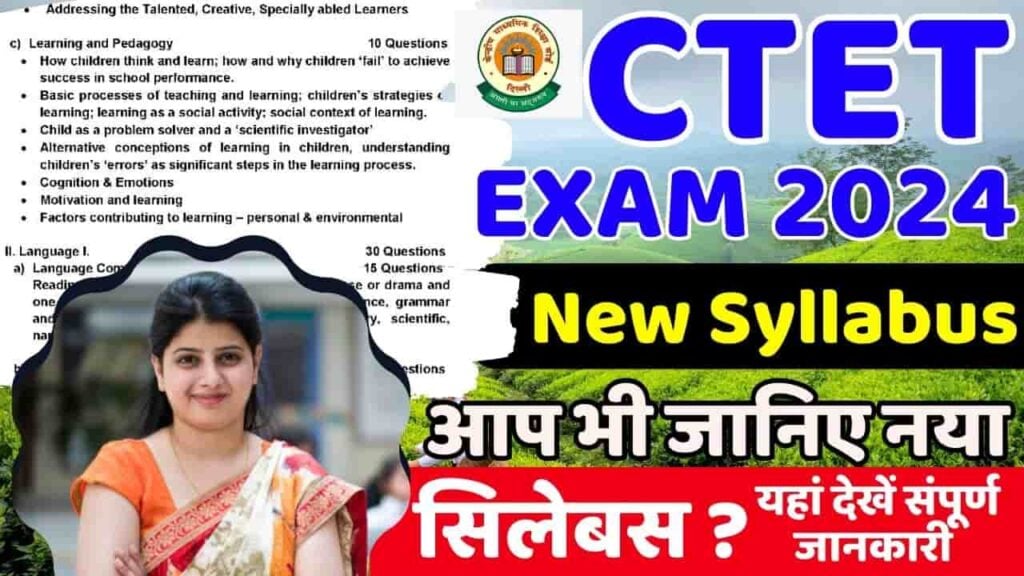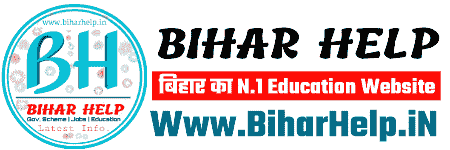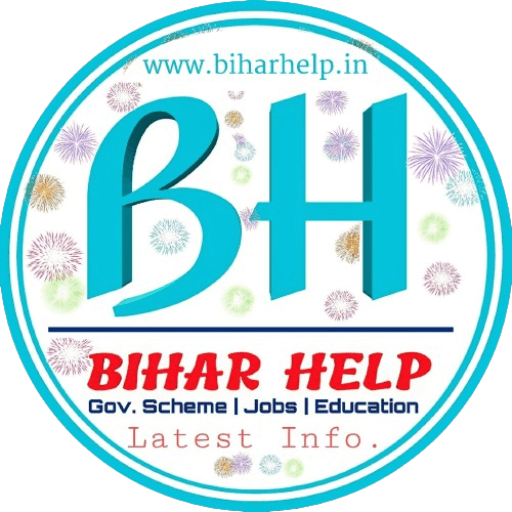CTET Syllabus 2024 In Hindi: क्या आप भी केंद्रीय शिक्षक पात्रता परीक्षा की तैयारी कर रहे है तो आपके पेपर 1 व पेपर 2 की तैयारी को बूस्ट करने और आपकी सफलता की संभावनाओं को बढ़ाने के लिए हम, आपको इस लेख मे विस्तार से CTET Syllabus 2024 In Hindi के बारे में बतायेगे जिसके लिए आपको ध्यानपूर्वक इस लेख को पढ़ना होगा।

आपको बता दें कि, CTET Syllabus 2024 In Hindi की जानकारी देने के साथ ही साथ हम, आपको बता दें कि, CTET Notification 2023 को जारी कर दिया गया है जिसके Official Notification PDF Link हम, आपको इस लेख मे प्रदान करेगे जिसके लिए आपको अन्त तक हमारे साथ बने रहना होगा तथा
आर्टिकल के अन्त में हम, आपको क्विक लिंक्स प्रदान करेगे ताकि आप आसानी से इसी प्रकार के आर्टिल्स को प्राप्त करके इनका लाभ प्राप्त कर सकें।
Read Also – Jee Mains Syllabus 2024: जेईई मेन्स 2024 का नया सेलेबस NTA ने किया जारी, जाने पूरा सेलेबस और करें एग्जाम में हाई स्कोर?

CTET Syllabus 2024 In Hindi – Overview
| Name of the Board |
The Central Board of Secondary Education |
| Name of the Exam |
Central Teacher Eligibility Test (CTET) |
| Edition of Exam |
18th Edition |
| Name of the Article |
CTET Syllabus 2024 In Hindi |
| Type of Article |
Syllabus |
| Detailed Information of CTET Syllabus 2024 In Hindi? |
Please Read The Article Completely. |
CBSE Board के Dec CTET का Syllabus PDF जारी, अब नहीं होगी परीक्षा की तैयारी मे कोई परेशानी – CTET Syllabus 2024 In Hindi?
आप सभी परीक्षार्थी जो कि, CTET प्रवेश परीक्षा की तैयारी कर रहे है उनका इस लेख मे हार्दिक स्वागत करते हुए हम, आपको स्तार से CTET Syllabus 2024 In Hindi के बारे मे बतायेगें जो कि, इस प्रकार से है –
Read Also –
STRUCTURE AND CONTENT OF SYLLABUS
Paper I (for classes 1 to V) Primary Stage
Child Development and Pedagogy
Child Development (Primary School Child)
- Concept of development and its relationship with learning
- Principles of the development of children
- Influence of Heredity& Environment
- Socialization processes:Social world& children (Teacher,Parents,Peers)
- Piaget,Kohlberg andVygotsky:constructs and critical perspectives
- Concepts of child-centered and progressive education
- Critical perspective of the construct of Intelligence
- Multi-Dimensional Intelligence
- Language&Thought
- Gender as a social construct;genderroles, gender-bias and educational practice
- Individual differences among learners, understanding differences based on diversity of language, caste, gender, community,religion etc.
- Distinction between Assessment for learning and assessment of learning; School-Based Assessment, Continuous& ComprehensiveEvaluation:perspective and practice
- Formulating appropriate questions for assessing readiness levels of learners; for enhancing learning and critical thinking in the classroom and for assessing learner achievement.
b) Concept of Inclusive education and understanding childrenwith special needs
- Addressing learners from diverse backgrounds including disadvantaged and deprived
- Addressing the needs of children with learning difficulties,„impairment‟etc.
- Addressing theTalented,Creative,Specially abled Learners
c) Learningand Pedagogy
- How children think and learn; how and why children „fail‟ to achieve success in school performance.
- Basic processes of teaching and learning; children‟s strategies of learning; learning as a social activity;social context of learning.
- Child as a problem solver and a„scientific investigator‟
- Alternative conceptions of learning in children, understanding children‟s „errors‟ as significant steps in the learning process.
- Cognition & Emotions
- Motivation and learning
- Factors contributing to learning – personal & environmental
II. Language I
a) Language Comprehension
- Reading unseen passages – two passages one prose or drama and one poem with questions on comprehension, inference, grammar and verbal ability (Prose passage may be literary, scientific, narrative or discursive)
b) Pedagogy of Language Development
- Learning and acquisition
- Principles of language Teaching
- Role of listening and speaking; function of language and how children use it as a tool
- Critical perspective on the role of grammar in learning a language for communicating ideas verbally and in written form
- Challenges of teaching language in a diverse classroom; language difficulties, errors and disorders
- Language Skills
- Evaluating language comprehension and proficiency: speaking, listening, reading and writing
- Teaching- learning materials: Textbook, multi-media materials, multilingual resource of the classroom
- Remedial Teaching
III. Language -II
a) Comprehension
- Two unseen prose passages (discursive or literary or narrative or scientific) with question on comprehension, grammar and verbal ability
b) Pedagogy of Language Development
- Learning and acquisition
- Principles of languageTeaching
- Role of listening and speaking;function of language and how children use it as a tool
- Critical perspective on the role of grammar in learning a language for communicating ideas verbally and in written form
- Challenges of teaching language in a diverse classroom; language difficulties, errors and disorders
- LanguageSkills
- Evaluating language comprehension and proficiency: speaking, listening, reading and writing
- Teaching – learning materials:Textbook, multi-media materials, multilingual resource of the classroom
- RemedialTeaching
IV Mathematics
a) Content
- Geometry
- Shapes & Spatial Understanding
- Solids around Us
- Numbers
- Addition and Subtraction
- Multiplication
- Division
- Measurement
- Weight
- Time
- Volume
- Data Handling
- Patterns
- Money
b) Pedagogical issues
- Nature of Mathematics/Logical thinking; understanding children‟s thinking and reasoning patterns and strategies of making meaning and learning
- Place of Mathematics in Curriculum
- Language of Mathematics
- Community Mathematics
- Evaluation through formal and informal methods
- Problems ofTeaching
- Error analysis and related aspects of learning and teaching
- Diagnostic and Remedial Teaching
V. Environmental Studies
a) Content
- Family and Friends: Relationships, Work and Play, Animals, Plants
ii. Food
iii. Shelter
iv. Water
v. Travel
vi. ThingsWe Make and Do.
b) Pedagogical Issues
- Concept and scope of EVS
- Significance of EVS, integrated EVS
- EnvironmentalStudies & Environmental Education
- Learning Principles
- Scope & relation toScience&SocialScience
- Approaches of presenting concepts
- Activities
- Experimentation/PracticalWork
- Discussion
- CCE
- Teaching material/Aids
- Problems
Read Also – Bihar ANM Syllabus 2023 – Bihar ANM Exam Pattern
Paper II (for classes VI to VIII) Elementary Stage
I. Child Development and Pedagogy
a) Child Development (Elementary School Child)
- Concept of development and its relationship with learning
- Principles of the development of children
- Influence of Heredity& Environment
- Socialization processes:Social world& children (Teacher,Parents,Peers)
- Piaget,Kohlberg andVygotsky:constructs and critical perspectives
- Concepts of child-centered and progressive education
- Critical perspective of the construct of Intelligence
- Multi-Dimensional Intelligence
- Language&Thought
- Gender as a social construct;genderroles, gender-bias and educational practice
- Individual differences among learners, understanding differences based on diversity of language, caste, gender, community,religion etc.
- Distinction between Assessment for learning and assessment of learning; School-Based
Assessment, Continuous& ComprehensiveEvaluation:perspective and practice
- Formulating appropriate questions for assessing readiness levels of learners; for enhancing
learning and critical thinking in the classroom and for assessing learner achievement.
b) ConceptofInclusive education and understanding childrenwith special needs
- Addressing learners from diverse backgrounds including disadvantaged and deprived
- Addressing the needs of children with learning difficulties,„impairment‟etc.
- Addressing theTalented,Creative,Specially abled Learners
c) LearningandPedagogy
- How children think and learn; how and why children „fail‟ to achieve success in school
performance.
- Basic processes of teaching and learning; children‟s strategies of learning; learning as a
social activity;social context of learning.
- Child as a problem solver and a„scientific investigator‟
- Alternative conceptions of learning in children, understanding children‟s „errors‟ as
significant steps in the learning process.
- Cognition & Emotions
- Motivation and learning
- Factors contributing to learning – personal & environmental
II. Language I
a) Language Comprehension
- Reading unseen passages – two passages one prose or drama and one poem with questions on
comprehension, inference, grammar and verbal ability (Prose passage may be literary,
scientific, narrative or discursive)
b) Pedagogy ofLanguage Development
- Learning and acquisition
- Principles of languageTeaching
- Role of listening and speaking;function of language and how children use it as a tool
- Critical perspective on the role of grammar in learning a language for communicating ideas
verbally and in written form;
- Challenges of teaching language in a diverse classroom; language difficulties, errors
and disorders
- Language Skills
- Evaluating language comprehension and proficiency: speaking, listening, reading and
writing
- Teaching- learning materials: Textbook, multi-media materials, multilingual resource of the
classroom
- Remedial Teaching
III. Language-II
a) Comprehension
- Two unseen prose passages (discursive or literary or narrative or scientific) with question on
comprehension, grammar and verbal ability
b) Pedagogy of Language Development
- Learning and acquisition
- Principles of languageTeaching
- Role of listening and speaking;function of language and how children use it as a toolCritical perspective on the role of grammar in learning a language for communicating ideas
verbally and in written form;
- Challenges of teaching language in a diverse classroom; language difficulties, errors
and disorders
- LanguageSkills
- Evaluating language comprehension and proficiency: speaking, listening, reading and
writing
- Teaching – learning materials: Textbook, multi-media materials, multilingual resource ofthe
classroom
- RemedialTeaching
IV. Mathematics and Science
(i) Mathematics
Number System
- Knowing our Numbers
- Playing with Numbers
- Whole Numbers
- Negative Numbers and Integers
- Fractions
Algebra
- Introduction to Algebra
- Ratio andProportion
Geometry
- Basic geometrical ideas (2-D)
- Understanding ElementaryShapes (2-D and 3-D)
- Symmetry:(reflection)
- Construction (using Straight edge Scale, protractor, compasses)
- Mensuration
- Data handling
b) Pedagogical issues
- Nature of Mathematics/Logical thinking
- Place of Mathematics in Curriculum
- Language of Mathematics
- Community Mathematics
- Evaluation
- RemedialTeaching
- Problem ofTeaching
i) Science
Food
- Sources of food
- Components of food
- Cleaning food
Materials
- Materials of daily use
- The World of the Living
- MovingThings People and Ideas
- How thingswork
- Electric current and circuits
- Magnets
- Natural Phenomena
- Natural Resources
b) Pedagogical issues
- Nature& Structure of Sciences
- NaturalScience/Aims & objectives
- Understanding & AppreciatingScience
- Approaches/IntegratedApproach
- Observation/Experiment/Discovery (Method of Science)
- Innovation
- TextMaterial/Aids
- Evaluation – cognitive/psychomotor/affective
- Problems
- RemedialTeaching
V. Social Studies/Social Sciences
a) Content
History
- When,Where and How
- The Earliest Societies
- The First Farmers and Herders
- The First Cities
- Early States
- New Ideas
- The First Empire
- Contacts with Distant lands
- Political Developments
- Culture and Science
- New Kings andKingdoms
- Sultans of Delhi
- Architecture
- Creation of anEmpire
- Social Change
- Regional Cultures
- The Establishment of CompanyPower
- Rural Life andSociety
- Colonialism andTribalSocieties
- The Revolt of 1857-58
- Women and reform
- Challenging the Caste System
- The Nationalist Movement
- India After Independence
Geography
- HumanEnvironment:settlement, transport and communication
- Resources:Types-Natural and Human
- Agriculture
- Geography as a social study and as a science
- Planet:Earth in the solar system
- Globe
- Environment in its totality:natural and human environment
- Air
- Water
Social and Political Life
- Diversity
- Government
- Local Government
- Making a Living
- Democracy
- State Government
- Understanding Media
- Unpacking Gender
- The Constitution
- Parliamentary Government
- The Judiciary
- Social Justice and the Marginalised
b) Pedagogical issues
- Concept & Nature of Social Science/Social Studies
- Class Room Processes, activities and discourse
- Developing Critical thinking
- Enquiry/Empirical Evidence
- Problems of teaching Social Science/Social Studies
- Sources -Primary& Secondary
- Projects Work
- Evaluation आदि।
अन्त, इस प्रकार हमने आपको विस्तार से पूरे पाठ्यक्रम के बारे में बताया ताकि आप सभी इसका पूरा – पूरा लाभ प्रकार कर सकें।
Conclusion
हमारे वे सभी विदयार्थी परीक्षार्थी जो कि, CBSE Board द्धारा आयोजित किये जाने वालें केंद्रीय शिक्षक पात्रता परीक्षा मे बैठने वाले है उनकी तैयारी को बूस्ट करने के लिए हमने आपको विस्तार से CTET Syllabus 2024 In Hindi के बारे मे बताया ताकि आसानी से अपनी भर्ती परीक्षा की तैयारी कर सके और अपार सफलता प्राप्त कर सके तथा
अन्त, हमे उम्मीद है कि, आप सभी परीक्षार्थियो को हमारा यह आर्टिकल बेहद पसंद आया होगा जिसके लिए आप हमारे इस आर्टिकल को लाइक, शेयर व कमेंट करेगे।
Quick Links
| Official Website |
Website |
| Join Our Telegram Group |
Website |
| Direct Link of Official Syllabus & Notification |
Website
|
FAQ’s – CTET Syllabus 2024 In Hindi
सीटेट का फॉर्म कब भरा जाएगा 2024?
जिसके अनुसार यह बताया जा रहा है कि CTET Application form Starting Date 27 अप्रैल 2024 होगी। उम्मीदवार को 26 मई 2024 से पहले विभाग की आधिकारिक वेबसाइट पर ऑनलाइन आवेदन कर करना होगा।
2023 में सीटेट का नोटिफिकेशन कब जारी होगा?
2023 में सीटेट का नोटिफिकेशन कब जारी होगा?
BiharHelp App
आपके उज्जवल भविष्य के लिए महत्वपूर्ण जानकारी यहाँ उपलब्ध है - सरकारी नौकरियाँ, परीक्षा परिणाम, प्रवेश पत्र और शैक्षिक अवसर। नवीनतम अपडेट और आवश्यक सूचनाओं के लिए BiharHelp ऐप डाउनलोड करें - आपकी सफलता का साथी।
Related Posts
- Bihar Home Guard Havildar Clerk Syllabus 2026: Exam Pattern, Subject-Wise Syllabus & PET Details
- SSC MTS Syllabus 2026: CBT Exam Pattern, Physical Test Details, Subject-Wise Syllabus & PDF Download
- UP Police Constable Syllabus 2026 – Exam Pattern, Subject-Wise Topics and New Preparation Guide
- UP Lekhpal New Syllabus 2026: Exam Pattern, Selection Process & PDF Download
- SSC GD Syllabus 2026: Exam Pattern, Selection Process, CBT Syllabus, PET/PST Details & PDF Download
- Bihar BEd Syllabus 2026: Exam Pattern, Subject-Wise Topics, Selection Process & PDF Download
- RRB Group D Syllabus 2026 PDF Download – Exam Pattern & Subject Wise Details
- UP Police Computer Operator Syllabus 2026: Exam Pattern, Selection Process, Subject-Wise Detailed Syllabus & PDF Download
- BTSC Pump Operator Syllabus 2025: Exam Pattern, Selection Process & PDF Download
- DSSSB MTS Syllabus 2026: Exam Pattern, Selection Process & Subject-wise Topics PDF
Jobs & शिक्षा से जुड़ी सभी जानकारी ! (यहाँ Click करें 👆)



